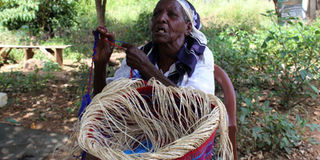Independent granny who weaves Kiondos for a living

What you need to know:
- At age 92, the energetic granny earns a living from from weaving Kiondos
- She spends time tilling her shamba near her home
- Wambui gets her raw materials from Kariokor Market in Nairobi
- Most of her clients are women
- She takes the Kiondos to Kariokor herself
- Lately, her Kiondo clients have dwindled in number
Traditionally, extended families have taken care of elderly family members because they are not fit enough to engage in income generating activities.
This, however, is not the case for Eunice Wambui Njoroge. When we visit her at her home in Ruai, in the outskirts of Nairobi, the granny is busy weaving her latest Kiondo while singing one of her favourite gospel songs.
She is a living proof that age is nothing but just a number. At age 92, the energetic granny, who was born in Mukuwe-ine, Nyeri County in 1928, aces out a living from weaving Kiondo.
Kiondo is a traditional Kikuyu basket women use for carrying their wares when they go to the market. Today, women use them as handbags and tourists visiting Kenya love them too.
Wambui says she moved to Nairobi after Kenya gained her independence in 1963. Her Kiondo business is a craft she started while still a young girl.
“My late mother introduced me to weaving Kiondos. She would weave and I would help her do it and later take them to a market in Ndia, Kirinyaga County, to sell them,” says Wambui.
FARMER
This, however, is not Wambui’s full time job. During the day, she spends time tilling her shamba near her home where she plants maize and beans for sale.
Lately, however, she has been unable to get a bumper harvest after thieves severally stole her produce in the farm during the night.
She says she weaves the Kiondos at night as she waits for supper, and just before going to bed.
“I also weave on Sundays after church. It is so much fun and I love doing it,” she says.
The granny weaves big and small-sized Kiondos which she sells at Sh2,000 and Sh1,500 respectively.
She does the sales from home because there is so much competition at the market where she could otherwise, take them.
Most of her clients are women who buy them for going to the market and for dowry payment ceremonies.
Wambui gets her raw materials from Kariokor Market in Nairobi, where she also gets the Kiondo handles fixed.
She takes them to Kariokor herself, much to the shock of her children and neighbours. With her advanced age, she can still manoeuvre her way in and out of the busy city.
“I do not fear the many vehicles on the road. I use my walking stick to wave them and order them to slowdown so that I can pass. The drivers always obey. They cannot knock down a woman of my age who qualifies to be their grandmother,” she says.

Eunice Wambui Njoroge 92, with some of the woven basket (Kiondo) she makes during the interview at her home in Ruai, Nairobi on February 12, 2020. PHOTO | LUCY WANJIRU | NATION MEDIA GROUP
The mother of three who disputes her age as indicated on the identity card, claims she is more than 100 years old.
She says her children who are all above 60 years are helpless, the reason she has to work hard.
“If I fail to work using my hands, I will go hungry since I have no one to look up to. My children have their families to take care of, and I do not want to burden them - they do not have jobs or businesses that bring them income,” she says.
Even though she admits to being a beneficiary of the government program that sees senior citizens receive a monthly stipend of Sh2,000, Wambui says it is not enough to adequately cater for her needs, especially because it delays most of the time.
Of late, she is not a happy woman as her Kiondo clients have dwindled in number, a thing she blames on the prevailing harsh economic times.
The granny says it takes as much as three months or more to sell even a single basket these days, and this has taken a toll on her.
She adds that most are the times women will promise to come for her products, but they never turn up. She can get stuck with as many as 20 baskets in stock.
She is appealing to women in need of Kiondos to get in touch with her, promising they are durable and of good quality.
SINCE CHILDHOOD
Alice Njeri, Wambui’s daughter in her 60s recalls seeing her mother weaving the baskets since she was a child.
Njeri terms her mother as a hardworking woman who hates staying idle and bothering others for her upkeep.
“God has been gracious to her as she has relatively enjoyed good health and kept her strong, which has enabled her to engage in her business,” she says.
The daughter, however, laments that the dwindling market for the baskets has negatively affected her mother.
“Many are the times she is stressed and frustrated that customers are no longer coming to buy her Kiondos,” she says.
A neighbour, Ruth Nyambura, says the granny is a role model to many young people in the area through her hard work.
“She has been a good example to the locals and particularly the youth, by showing them they can still make a coin from doing what they love. She always tells us not to rely on relatives or anyone else for help,” Nyambura says.





